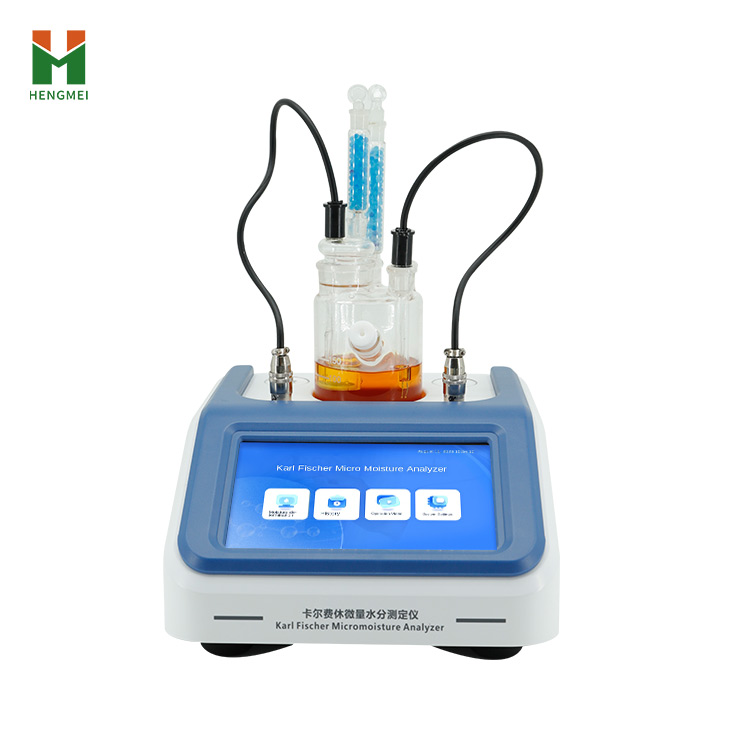In the fields of industrial analysis and quality control, accurate moisture determination is a crucial step. Whether in energy and chemical industries, pharmaceuticals and food, or new electronic materials, the presence of trace water often directly affects product performance, safety, and stability. The Karl Fischer Moisture Titrator, a high-precision moisture detection instrument based on the coulometric titration principle, is widely used for moisture testing across numerous industries due to its excellent performance and broad application scope.
This article will provide a comprehensive analysis of the Karl Fischer Moisture Titrator's importance, principle, technical advantages, application areas, solutions, and industry pain points, helping users gain an in-depth understanding and apply this technical tool appropriately.

Principle Analysis: Modern Application of a Classic Chemical Reaction
The basic principle of the Karl Fischer Moisture Titrator is the chemical method proposed by Karl Fischer in 1935, involving the quantitative reaction of water with iodine and sulfur dioxide in a pyridine and methanol buffer solution. Modern instruments primarily use the Coulometric method (for trace water determination) and the Volumetric method (for macro water determination).
Coulometric Method (Method used by this device): Its core is electrogenerated iodine. Iodide ions in the instrument's electrolytic cell are electrolytically oxidized at the anode to produce iodine molecules (2I⁻ → I₂ + 2e⁻). The generated iodine immediately reacts with the water in the sample. At the reaction endpoint, excess iodine is detected by the instrument, which stops the electrolysis. According to Faraday's law of electrolysis, there is a strict quantitative relationship between the electricity consumed during electrolysis and the water content. Therefore, the instrument can calculate the absolute mass of moisture in the sample with extreme precision and high sensitivity, making it particularly suitable for trace moisture analysis at the ppm (parts per million) level.
The entire process is automatically controlled, requiring no user calculations, achieving a high degree of automation from chemical reaction to data output.
Technical Advantages and Pain Point Solutions
Based on the above principle and combined with our company's latest technical specifications, the Karl Fischer Moisture Titrator provides a comprehensive solution that directly addresses numerous pain points in traditional user operations.
Pain Point 1: Complex operation, high training costs
Built-in operation videos & Chinese touch interface: Features a 7-inch LCD touch screen running the Android system with an intuitive interface. Beginners can quickly get started by watching built-in videos, significantly lowering the training threshold and learning costs.
Pain Point 2: Significant environmental interference, unstable results
Fully sealed titration cell design & precise control system: Employs a fully sealed titration cell bottle, effectively preventing ambient humidity interference and ensuring the accuracy and repeatability of determination results (Repeatability ≤ 2%).
Pain Point 3: Low efficiency, long waiting times
High-speed processing & rapid determination: Equipped with a high-performance ARM Cortex-A7 RK3288 quad-core processor. The determination process (stirring, measurement) is completed in about 60 seconds, with results immediately visible, greatly improving detection efficiency.
Pain Point 4: Cumbersome data management, prone to errors
Powerful data management function: Can store over 200,000 data points, supports historical record retrieval (by date, number, operator, etc.), and can generate and export Excel spreadsheets. Includes a built-in thermal printer for flexibly customizing print content (including QR codes). Results can be traced by scanning the code, perfectly complying with GLP/GMP norms.
Pain Point 5: Inconvenient maintenance and upgrades
Remote upgrade & cloud platform management: Equipped with a WiFi module, supporting data upload to a cloud platform for remote analysis and management. More importantly, it supports targeted remote updates, allowing software upgrades without returning the unit to the factory, saving time and effort and avoiding transportation risks.
Pain Point 6: Single application, lack of flexibility
Multiple methods & sample adaptability: Supports both volumetric and gravimetric sample introduction methods. Allows free editing of sample parameters (e.g., density, weight). Capable of testing various samples like oils, chemicals, pharmaceuticals, food, and supports continuous cycle testing (test immediately after placement).
Core Technical Parameters Ensure Performance:
Measurement Range: 0.01% ~ 100% (covers trace to macro levels)
Sensitivity Threshold: 0.01μg (extremely low detection limit)
Accuracy: ±2μg for 5μg-1mg water, 0.2% for >1mg water (highly reliable data)
Electrolysis Speed: Approx. 2mg/min (fast analysis speed)
Wide Application Areas
The application of Karl Fischer Moisture Titrators permeates almost all industries requiring precise water control.
Petrochemicals: Determining water in crude oil, transformer oil, lubricating oil, additives, etc.
Pharmaceutical Industry: Moisture determination in active pharmaceutical ingredients (APIs), intermediates, and finished drugs, strictly complying with pharmacopoeia requirements.
Food Industry: Determining moisture content in honey, candy, milk powder, edible oils, etc., crucial for taste and shelf life.
Chemical Reagents & Electronic Chemicals: Trace moisture determination in organic solvents like ethanol, acetone, isopropanol, as well as in ultra-high purity reagents for the semiconductor industry.
Others: Plastic pellets, dyes, coatings, natural gas, etc.
The Karl Fischer Moisture Titrator integrates classical chemical methods, precision hardware design, intelligent software systems, and IoT technology, offering a comprehensive moisture solution that combines accuracy, efficiency, safety, and intelligence.
Article address:https://www.petrocheminstrum.com/news/42.html








